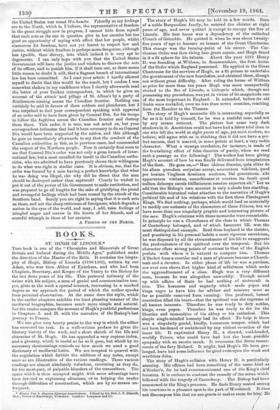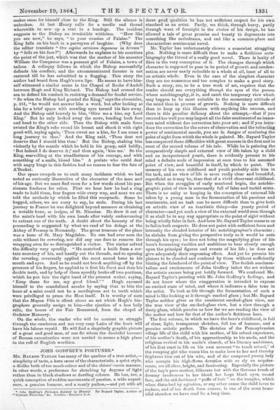BOOKS.
ST. HUGH OF LINCOLN.* Tars book is one of the "Chronicles and Memorials of Great Britain and Ireland during the Middle Ages," published under the direction of the Master of the Rolls. It contains the biogra- phy of Hugh, Bishop of Lincoln (1186-1200), written by one Adam, who was then Abbot of Eynsham, and who had been Chaplain, Secretary, and Keeper of the Vestry to the Bishop for the last three years of his life. This personal intimacy of the writer with his subject, a man of genial and communicative tem- per, gives to the work a special interest, increasing in a marked degree as we approach the period of which the author speaks from personal observation. At the same time the style, which in the earlier chapters exhibits the least pleasing manner of the medimval biographies, becomes much more simple and natural. Let the reader compare the account of Hugh's youthful perfections in Chapters. I. and II. with the narrative of the Bishop's last journey to France.
We can give very hearty praise to the way in which the editor has executed his task. In a well-written preface be gives the literary history of the work, and a short sketch of the life and character of St. Hugh. He has appended a very copious index, and a glossary, which is useful as far as it goes, but which by its necessary shortcomings reminds us how much we need a good dictionary of medireval Latin. We are tempted to quarrel with the regulation which forbids the addition of any notes, except such as are illustrative of the various readings. These various readings arc almost absolutely valueless, consisting as they do, for the most part, of palpable blunders of the transcribers. The space which is thus occupied might with more advantage have been devoted to explaining allusions, or to helping the reader through difficulties of construction, which are by no means un- frequen t.
• Maw: Vita s. littgonis Bpiscopi Lincoi.isis. Edlied by the Rev. J. F. Dimock, Rector of Baruburgb, Yorkshire. London: Longman and Co. The story of Hugh's life may be told in a few words. Born of a noble Burgundian family, he entered the cloister at eight years of age, and never quitted it except to occupy the See of Lincoln. His first home was a dependency of the cathedral Church of Grenoble. He quitted it when he was about twenty- five years of age to become an inmate of the Great Chartreuse. This change was the turning-point of his career. The Car- thusian Order was then rising into great repute, and Hugh found in it a fit sphere for his talents. About the year 1173 Henry H. was founding at Witham, in Sornersetshire, the first house of the Order which England possessed. He applied to the Great Chartreuse for the services of Hugh, as a fit person to undertake the government of the new foundation, and obtained them, though not without great difficulty. After ruling the house of Witham as prior for more than ten years Hugh was niost unexpectedly elected to the See of Lincoln, a bishopric which, though not possessing any precedence, was yet in virtue of its magnitude one of the most important in England. It extended, before its old limits were curtailed, over no less than seven counties, reaching from the Humber to the Thames.
The story of Hugh's monastic life is interesting, especially so far as it is told by himself, for ire was a truthful man, and not by any means reticent. The picture has some very dark shadows in it. Asceticism could not have had a fairer trial than in one who left the world at eight years of age, yet most readers, we believe, will agree with us in thinking that it did not have a per- fect success, that it marred, in some points at least, a very noble character. What a strange revelation, for instance, is made of the brutalizing effect of false theories of purity, when we read such a passage as the following ! The author has been giving Hugh's account of how he was finally delivered from temptations of the flesh. He goes on,—" Hrec idcirco dixerirn, quia aliter de his alium quendam scripsisse accepi, asserentem videlicet, quod per beatam Virginem dominam nostram, Del genetricem, sibi apparentem visitatus, eunuchizatus et curatus its fuerit quod nullarn deinceps muds titillationem omniuo expertus sit.'' Let us add that the Bishop's own account is only a shade less startling. Considerable historical value attaches to the narrative of Hugh's political life and of his relations with the first three Plantagenet Kings. We find nothing, perhaps, which would lead us materially to modify our estimate of the characters of these Princes, but we have more than one singularly graphic and interesting picture of
the men. Hugh's relations with these monarchs were remarkable. In principle he was a Churchman of the class to which Thomas
of Canterbury belonged, and of which Innocent III. was the most distinguished example. Bred from boyhood in the cloister, and practising in his personal habits a most rigorous asceticism, he was disposed by all the circumstances of his life to exaggerate the predominance of the spiritual over the temporal. But his character offers strong points of contrast to that of the English prelate with whom it is natural to compare him. Thomas A'Becket from a courtier and a man of pleasure became a Church- man and a devotee. In either phase of life he was a partizan, nor ever rose above that higher kind of selfishness which seeks the aggrandizement of a class. Hugh was a very different man, because he was altogether unworldly. Though mixed up with affairs of State he had nothing of statecraft in him. The keenness and sagacity which made popes and kings eager to have him for adviser and minister were as far as possible removed from cunning. One profound, honest conviction filled his heart—that the spiritual was the supremo of all human interests. Therefore he was ready to defy nobles, kings, even popes. Therefore he was ready to die for the liberties and immunities of his abbey or his cathedral. This simple single-minded honesty had its effect. To help it there was a singularly genial, kindly, humorous temper, which had not been hardened or embittered by any violent re-action of the inner life. It captivated Henry IL, a shrewd, cool-headed, worldly Prince, who could have had but the least possible sympathy with an ascetic monk. It overcame the fierce resent- ments of the fiery Richard. It might, had Hugh's life been pro- longed, have had some influence for good even upon the weak and worthless John.
The story of Hugh's collision with Henry If. is particularly amusing. His offence had been something of the same kind as A'Becket's, for he had excommunicated one of the King's chief foresters. It is curious to contrast the comedy of the scene which followed with the tragedy of Canterbury. The Bishop had been
summoned to the King's presence. Ho finds Henry seated among his courtiers in a pleasant spot in the park of Woodstock. It tIthes not discompose him that no one greets or makes room for hi . He makes room for himself close to the King. Still the silence is unbroken. At last Henry calls for a needle and thread wherewith to sew up a rent in a bandage. The incident suggests to the Bishop an irresistible witticism. "How like you are now," he says, "to your cousins of Falaise." The King falls on his back in a paroxysm of laughter. (Why does the editor translate Ore supino cervicem deponens in terram" by "falls on his face ?") Afterwards he explains to his courtiers the point of the jest, which was that the mother of his ancestor William the Conqueror was a peasant girl of Falaise, a town of tailors. A colloquy follows in which the Bishop successfully defends his conduct, and the excommunicated forester is not restored till he has submitted to a flogging. This story the author had heard from Hugh's own lips. He seems to have him- self witnessed a similar scene in the Chapel of Roche d'Andeli between Hugh and King Richard. The Bishop had crossed the sea to defend his conduct in resisting a demand for feudal service, "So when the Bishop had greeted the King," says the chronicler, p. 251, "he would not answer him a word, but after looking at him for a brief space with scowling eyes turned his face away. And the Bishop said bravely to him, Give me a kiss, my Lord King.' But he only looked away the more, bending both face and head to the other side. Then the Bishop with main force twisted the King's robe round his breast and shook it with right good-will, saying again, Thou owest me a kiss, for I am come a long journey to thee.' And the King said, Thou dost not deserve that I should kiss thee.' But the Bishop, shaking him violently by the mantle which he held in his grasp, said boldly,
But indeed I do deserve it ;' and then again, kiss me.' So the King, marvelling at the steadfastness of his courage, and with something of a smile, kissed A prelate who could deal with angry kings in this fashion had no reason to fear the fate of A'Becket.
Our space compels us to omit many incidents which we had noted as curiously illustrative of the character of the inan and of his age. But we must find room for a few words about his pas- sionate fondness for relics. First we hear how he had a ring made to hold them, four fingers wide every way, and next we are told the methods by which he filled this receptacle. Some he begged, others, we are sorry to say, he stole. During his last journey to France be was delighted beyond measure at obtaining a notable bone, os insigne, of St. Nicasius. He drew it out of the saint's head with his own bands after vainly endeavouring to extract one of the teeth. A doubt about the honesty of the proceeding is suggested by what- we read of his doings at the Abbey of Fecamp in Normandy. The great treasure of the place was a bone of St. Mary Magdalen. No one had ever seen the relic without its covering, nor did any one dare to remove the wrapping even for so distinguished a visitor. The visitor solved the difficulty very speedily. "He snatched a knife from a cer- tain secretary of his, and hastily cut the threads, and so opening the covering, reverently applied the most sacred bone to his mouth and eyes. And as he could not break anything off by the pressure of his fingers, he applied to it first his front and then his double teeth, and by help of them speedily broke off two portions, which he put into the right band of the present writer, saying,
Keep these for me, my good friend.'" Hugh excused himself to the scandalized monks by saying that to bite time bone of a saint could not be a sacrilegious act in teeth which were privileged to press the Host itself. It is worthy of note that the Magna Vita is silent about an act which Hugh's bio- graphers generally assign to him—the ejection of a less holy relic, the bones of the Fair Rosamond, from the chapel of Godstow Nunnery.
On the whole, the reader who will be content to struggle through the cumbrous and not very easy Latin of the book will have his labour repaid. He will find a singularly graphic picture of a great and good man, of one for whom the doubtful honours of Roman canonization were not needed to secure a high place in the roll of English worthies.































 Previous page
Previous page